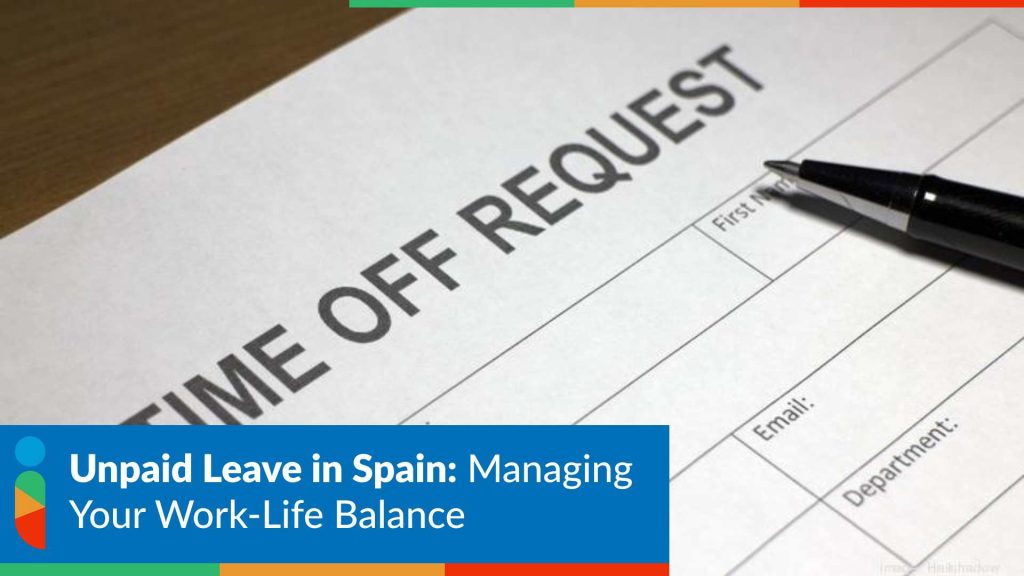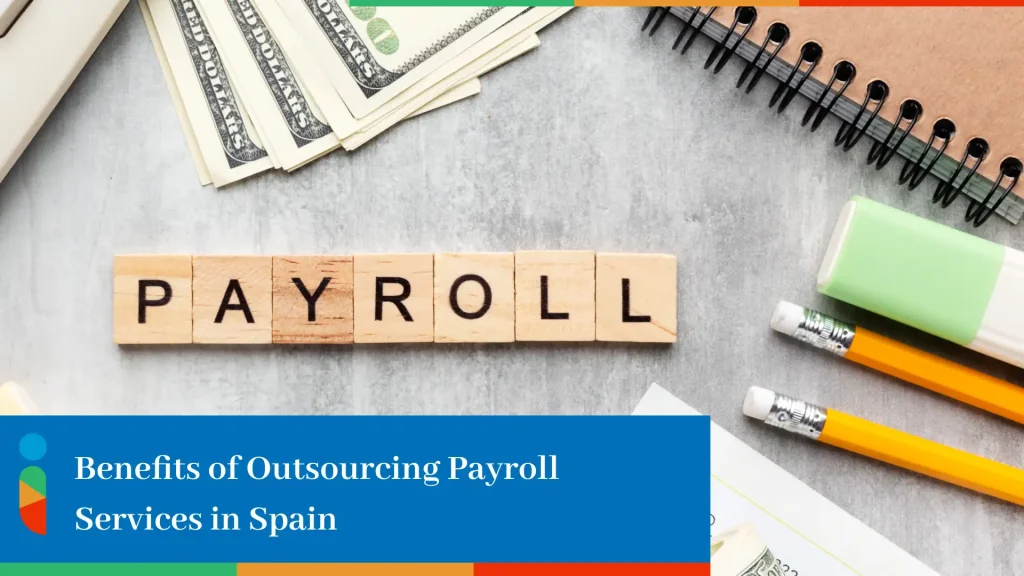Unpaid leave in Spain holds increasing significance for managing work-life balance, facilitating flexibility and autonomy for employees. Consequently, understanding its dynamics becomes essential.
In this article you can learn about the legal framework, eligibility criteria, and implications for individuals.
Types of Unpaid Leave Exploring Your Options in Spain

Spain’s vibrant culture and sun-soaked beaches beckon, but before trading your desk for a siesta, understanding your unpaid leave in Spain options is crucial.
Firstly, grasp your fundamental rights:
- Annual Leave: Every Spanish employee enjoys a generous 30 paid vacation days in Spain annually, typically divided into manageable blocks. Like days off Spain.
- Personal Leave: Emergencies happen. You’re entitled to 2 paid personal leave days per year for unforeseen circumstances, like doctor’s appointments or family needs.
Next, delve into the diverse unpaid leave options:
- Leave of Absence (Excedencia): Take a temporary, unpaid break for personal reasons, lasting from 4 months to 5 years. Remember, seniority and benefits might be affected.
- Family Leave: Extend your time off for family-related needs. Care for a child under 3, a dependent, or a newly adopted child. Duration varies depending on the specific situation. You need a holiday calculator Spain.
- Educational Leave: Pursue studies or training with unpaid leave, typically for a maximum of 3 years. Your employer might hold your position, but not your salary.
Remember, additional possibilities exist:
- Medical Leave: Take unpaid leave for medical reasons beyond sick leave coverage. Duration limitations and potential benefit loss apply.
- Strike Action: Participate in legally authorized strikes, but remember, no pay during this period.
What is the unpaid leave law in Spain?
Spain’s legislation grants employees the right to take unpaid leave, offering flexibility for personal matters.
- Governed by labor codes and collective agreements, it allows time off for various reasons.
- For instance, examples include illness, family care, emergencies, or educational pursuits.
-
- Maternity and paternity leave are statutory entitlements, safeguarded by Spanish labor laws. Moreover, the concept emphasizes the significance of work-life balance and employee welfare.
-
- Consequently, it ensures individuals can address personal needs without jeopardizing job security. Furthermore, employers are urged to establish supportive policies for managing unpaid leave requests.
-
- Importantly, effective communication between employers and employees is vital for smooth leave management.
-
- By accommodating such requests, employers foster a positive work environment and enhance employee satisfaction.
- Ultimately, Spain’s unpaid leave law promotes a healthier and more harmonious workplace culture.
Maternity/Paternity Unpaid Leave
Spain’s generous paid maternity and paternity leave provides a welcome foundation for new parents.
Firstly, understand your paid leave entitlements:
- Maternity Leave: Mothers are entitled to 16 weeks of paid leave, with an optional extension of 2 weeks for twins or babies with disabilities.
- Paternity Leave: Fathers are entitled to the same 16-week paid leave, fostering shared parental responsibility.
Next, delve into the diverse unpaid leave options:
- Leave of Absence (Excedencia): After paid leave concludes, take an unpaid break for up to 3 years to care for your child. Remember, your position might not be guaranteed upon return.
- Reduction in Working Hours (Reducción de jornada): Opt for fewer working hours while receiving a proportional salary. This allows a gradual return to work while managing childcare responsibilities.
- Flexible Working Arrangements: Negotiate flexible work arrangements with your employer, such as teleworking or flexible hours, to maintain career engagement.
Remember, further possibilities exist:
- Family Leave: Extend your unpaid leave for broader family needs, such as caring for a dependent or a newly adopted child. Duration varies depending on the specific situation.
- Company Policies: Some companies offer additional unpaid leave options beyond legal requirements. Check your company’s policies for tailored benefits.
Additional considerations:
- Financial Planning: Unpaid leave in Spain means reduced income. Careful budgeting is crucial to ensure financial stability during this period.
- Career Impact: Consider the potential impact of extended leave on your career progression and seniority.
- Support Network: Build a strong support network of family, friends, and colleagues for emotional and practical support during this time.
Personal Leave of Absence
Personal leave in Spain allows employees to handle personal matters without risking their employment, providing flexibility and support. Consequently, individuals can address family or health issues, managing unexpected situations effectively. Employers are required to grant personal leave requests according to labor laws and agreements.
Therefore, understanding the procedures for requesting personal leave is crucial. Employees must provide documentation or justification as needed. In essence, personal leave contributes to a supportive workplace culture that values employees’ well-being and work-life balance.
Sabbatical Leave
The sabbatical year, a temporal escape from professional obligations, transforms into a crucible for introspection and personal metamorphosis. It dismantles the monotonous chains of routine, revealing expansive landscapes ripe with new perspectives, a fertile terrain for intellectual and creative flourishing.
This voluntary exile prompts a reassessment of priorities, reigniting passions snuffed out by the daily grind. Thus, a siren song beckons individuals inward, on an odyssey of self-discovery. Through a kaleidoscope of experiences, continents traversed.
Artistic tools wielded, academic halls explored, each becomes a transformative brushstroke on the canvas of life. Here, a primal thirst for renewal finds solace, a sanctuary for reflection and the forging of renewed vigor before the professional call.
Embrace the sabbatical, and embark on a pilgrimage towards a more integrated existence, were professional aspirations and personal fulfillment dance in harmony. In the dynamic landscape of life, prioritizing self-care is paramount. The sabbatical, a sanctuary for personal growth, becomes an essential tool for navigating life’s difficulties.
It serves as a catalyst for resilience and adaptability. By embracing sabbaticals, individuals cultivate holistic development, fostering deeper self-understanding and purpose.
The Effect of Unpaid Leave on Finances
Emotionally, this interruption becomes a rollercoaster ride of uncertainty and stress. The tremors are felt not just by the individual, but ripple through familial bonds, leaving a trail of anxiety and unease. It’s a tightrope walk across a chasm of uncertainty, with doubts gnawing at the heart.
Professionally, it’s a career cliffhanger, potentially derailing trajectories and leaving individuals questioning their footing upon reintegration. Moreover, the specter of skill erosion looms, and the climb back up the ladder can feel daunting. It’s a professional purgatory, a temporary exile from the familiar routines and rhythms of work.
Yet, amidst the chaos, glimmers of opportunity emerge. Unpaid leave in Spain becomes a fertile ground for personal growth, a sanctuary for neglected passions and self-reflection. It offers a chance to breathe, to prioritize well-being, a stolen moment amidst the professional storm.
- It’s a rich ground for personal evolution, a chance to rediscover oneself outside the confines of work.
Furthermore, it fosters resilience, forging a steely resolve in the crucible of uncertainty. Individuals emerge not just unscathed. But adaptable, capable of navigating uncharted waters with newfound confidence. It’s a crash course in adaptability, a baptism by fire that strengthens the spirit.
But navigating this labyrinth requires a strategic map. Meticulous financial planning lays the foundation, emotional resilience provides the compass, and a proactive approach to career development guides the path. Moreover, it’s a strategic chess game, requiring careful planning and calculated moves.
While it can disrupt and destabilize, it can also nurture personal growth and forge resilience. By embracing the complexities with a proactive mindset, individuals can cross this period with strength. It’s not a ride for the weak of heart, but one that can ultimately lead to personal and professional transformation.
Government Assistance
Government assistance during unpaid leave in Spain is pivotal for individuals grappling with financial strain due to income cessation. Through various welfare programs, Spain endeavors to alleviate this burden.
Unemployment benefits offer crucial support, replacing a portion of lost income during unpaid leave. Additionally, Spain provides housing subsidies, healthcare coverage, and utility bill assistance to mitigate financial hardship.
Moreover, collaborative efforts with employers and trade unions aim to implement supportive policies and programs. These initiatives cater to diverse needs during periods of financial instability, promoting social cohesion and resilience.
Overall, government assistance in Spain during unpaid leave safeguards well-being and financial security. By providing essential resources, it mitigates adverse impacts and fosters economic resilience.
Emergency Fund Essentials
Financial tempests fury, unforeseen expenses like rogue waves threatening to capsize stability. The emergency fund, a stoic bulwark, stands firm. Precisely built, brick by brick of sacrificed income, it offers sanctuary from the storm. Diversification, the architect’s cunning ploy, ensures the fortress withstands market quakes.
Yet, true power lies in accessibility. Not a gilded cage, but a war chest readily deployed, quelling urgent needs before they spiral. Financial first aid, swiftly administered, minimizes the unforeseen’s sting.
In Spain, economic winds can do an erratic spin. The emergency fund transforms from necessity to strategic imperious, a buffer against turbulence empowering individuals to weather the storm with calmness.
But its impact transcends practicality. Peace of mind, a silent guardian, quells anxieties born of uncertainty. It’s a psychological shield, bolstering confidence to navigate turbulent seas.
Therefore, the emergency fund is more than a financial tool. It’s a testament to resilience, a strategic reserve built with foresight and discipline. It’s not just about surviving the storm, but emerging stronger, more prepared for the ever-shifting financial landscape.
So, contribute diligently, diversify strategically, and remember: the emergency fund is not a treasure to hoard. But a fortress built to safeguard your financial well-being, a sanctuary in life’s wild sea.
Pros & Cons of Unpaid Leaves in Spain
In the sunlit cradle of Spain’s generous paid leave, a hidden door beckons: the realm of unpaid leave. Tread carefully, for within lies a labyrinth of potential, fraught with both shimmering rewards and lurking pitfalls. Just long-term leaves in Spain.
Pros:
- Unfurl the Bond: Unpaid leave grants precious extra threads to weave with your newborn, strengthening the parent-child connection into an intricate masterpiece.
- Ignite the Spark: This period becomes a tinderbox for self-discovery, allowing you to reignite neglected passions and hobbies, rekindling long-dormant flames.
- Paint Your Childcare Canvas: Unpaid leave offers the brushstrokes of flexibility, enabling you to explore bespoke childcare solutions, from homeschooling frescoes to customized arrangements.
- Metamorphosis at Work: For those seeking a professional transformation, unpaid leave can be a strategic cocoon, allowing you to acquire new skills or certifications, potentially morphing your future employability.
However, the cons:
- Financial Precipice: Stepping into unpaid leave risks a financial tightrope walk, potentially plunging you into strain and jeopardizing your savings’ carefully built edifice.
- Career Stagnation: Extended absence from work can lead to professional stagnation, dimming your prospects for promotions or new opportunities.
- Skill Erosion: Taking a break from your field can result in skill atrophy, requiring extra effort to regain proficiency upon return.
- Social Security Chasm: During unpaid leave in Spain, social security contributions may cease, potentially creating gaps in your future safety net.
Other aspects to be considered in unpaid leave in Spain
- Seek Company Guidance: Some companies offer additional leave options or financial support programs beyond legal requirements. Consult your company’s policies for hidden treasures.
- Government Aid: Explore potential government benefits available during unpaid leave, such as childcare subsidies, to ease the financial burden.
- Financial Foresight: Meticulous financial planning is crucial to navigate this period with stability. Build a financial fortress to weather the storm.
- Forge a Support Network: Cultivate a strong support network of family and friends, a haven of emotional and practical assistance.
Unpaid leave in Spain is a calculated gamble, not a blind leap. Weigh the potential rewards and risks carefully, ensuring they align with your unique aspirations. For in this intricate dance between family and finances, only those who navigate with foresight and preparation can truly emerge triumphant.
Conclusion

Unpaid leave in Spain offers a vital mechanism for individuals to manipulate the demands of work and personal life. It serves as a flexible solution, granting employees the freedom to attend to various personal matters without compromising their job security.
Moreover, it fosters a culture of empathy and understanding within workplaces, acknowledging the diverse needs of employees. Through effective communication and planning, both employers and employees can navigate unpaid leave arrangements seamlessly.
Embracing unpaid leave as a strategic approach to work-life balance cultivates a more harmonious and resilient workforce in Spain. Contact us to learn more about it.






